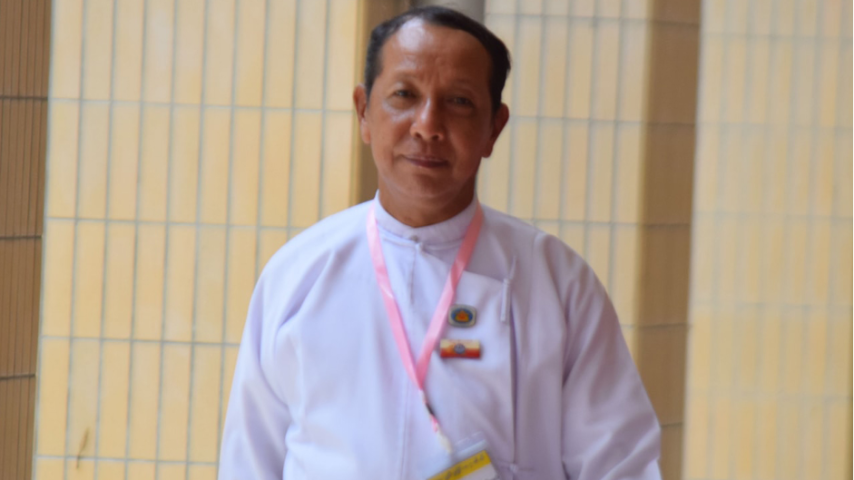An interview with U Pe Than, a former member of the Rakhine parliament for Myebon Township
The Myanmar military council detained Arakanese writer Wai Hun Aung and members of a relief aid group on 23 May while traveling to deliver relief supplies to communities affected by Cyclone Mocha, which made landfall in Arakan State on 14 May. The regime released the writer Wai Hun Aung on the next day, 24 May.
In an interview with Narinjara, U Pe Than, a former member of the Rakhine parliament for Myebon Township, expressed his opinions on the incident.
Q – The military council arrested Arakanese writer and charity leader Wai Hun Aung, who was distributing relief goods on 23 May, and released him the next day, 24 May. What is your opinion about his arrest?
A – The role of intermediary groups or individuals who can distribute domestic and international relief goods is crucial right now. So an abrupt arrest of such a charity leader who does social work shouldn’t have happened at all. Because all the people affected by the storm are in urgent need of help. And this isn’t a time of armed fighting in Arakan State. His arrest was obviously not politically motivated. It seems to me that the regime has deliberately made the arrest to discourage or intimidate aid team members from helping the people.
Q – The storm caused extensive damage in Arakan State. It claimed more than 100 lives and affected millions of people. The role of charity groups is critical. How might this arrest affect reconstruction efforts in townships affected by the storm?
A – People are facing a lot of misery right now caused by Cyclone Mocha. Some people aren’t yet able to live in proper shelter. They’re having difficulty getting food, clothing and shelter. Roads, houses and buildings have all been damaged. Aid will come from the military council, Arakan Army, civil society organizations, non-governmental organizations, international non-governmental organizations and donors. Reconstruction cannot begin until the aid reaches those affected. This is where the important role of intermediary groups and individuals or aid organizations comes into play. Without them, storm victims may not get the help they really need. That’s why I’d urge members of charities to courageously continue social work in the face of adversity.
Q – We have learned that the military council still carries out strict controls on transportation routes and requires permission from the minister of border affairs and security for travel, as it did during the conflict period, even at a time when people were facing great hardship due to the storm. How do you think that hinders disaster relief?
A – If that’s true, they shouldn’t be doing that at all. It would be unreasonable for the government authorities, who are actually responsible for the country, to hinder the people who are coming to help the people who are suffering. In fact, the government itself can’t provide enough support to the people. Such behavior also means that the good will of other people is blocked. At this time, the government is responsible for making sure that the help reaches the people who need it. Therefore, I’d like to say that such actions, for whatever reason, shouldn’t be carried out.
Q – It looks like the United League of Arakan (ULA) and the military council are running parallel governments in Arakan State right now. Which group do you think the people of Arakan trust the most in the face of such a disaster?
A -The government that came to power in the military coup wasn’t supported by the people from the beginning. It has no support from the international community. It’s a government that is losing its political image. In international diplomacy, it’s mainly blamed and pressured. Since they have been in power, the people have had greater difficulties. They’re even against each other. Now they’re in a political and military crisis. At such a time, they should spend a large part of the national budget on alleviating people’s hardship with good will and compassion. Instead, they detain people doing charity work and block aid. If they continue to restrict aid from international organizations, people who already dislike the military country may develop even more resentment against them. The ULA /AA has already received popular support from the beginning. It has received even more support because it has done a lot of good for the public after the storm. We’re just witnessing how both sides behave toward the people. As for the military council, it already lacks public support. So I think the military council should show more magnanimity in this situation.
Sent by Narinjara.

